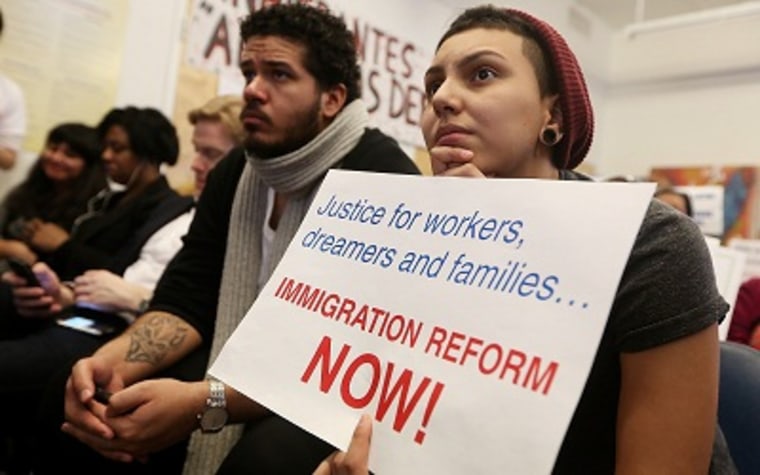When it comes to breaking down how language matters to our ability to address political issues, no one has been more influential from the progressive side of any discussion than George Lakoff. As a linguistics professor at the University of California at Berkeley and an author of books such as Don't Think of an Elephant: Know Your Values and Frame the Debate--The Essential Guide for Progressives, Lakoff has spent years writing about why we use certain words and why, as he says often, "language matters." Saturday's Melissa Harris-Perry brought in a panel to discuss the Associated Press' decision to stop using the word "illegal" to describe immigrants; Lakoff spoke with msnbc.com about that change and the other linguistic tricks and frames to keep track of in the immigration debate.
What do you think the AP change means?
A lot of people are beginning to understand the role of language in framing. Words really do matter. When you call someone an illegal immigrant, what you’re suggesting is that they’re a criminal. [Entering the U.S. illegally] is an act that didn't harm anybody in particular, that wasn't shooting somebody or robbing somebody or something. Immigrants came in to work and help people. They’re not criminals by any means. I think the fact that Hispanics are making up a larger part of our population and are important voting block being courted by Republicans shows that even they don’t want to call them criminals. They don’t want to go out and say, “Hey you guys are criminals, go out and vote for us.” Language is not neutral. If someone gets a DUI, you don’t call them an illegal driver for the rest of his life.
People who so many of us depend upon, who provide extremely important services, are not coming here to rob us, they are coming here to mow our lawns and cook our dinners and wash dishes and take care of kids and clean houses and do things that people need. To pick our vegetables, which a lot of people don’t want to do. They do very important stuff for our economy, for us individually, and you don’t want to think of them as criminals because they're not.
What is the significance of the path to citizenship frame? You've criticized it before.
President Obama said something really important last fall when he said that these folks are essentially citizens. They act like citizens, they do the things citizens do, that ideal citizens do. The idea of a path to citizenship is weird because it means they’re very far from being citizens, when basically they’re citizens except in terms of the rights given them and in terms of the name. I read today that somebody said that [immigrants applying for citizenship] had to “atone” for what they had done. How many years of functioning like a citizen, doing hard work that other people don’t want [do they need to do]? Atonement is not called for.
How do we change this? Is there any way to make it go faster?
The AP change is important. The words “illegal alien” were chosen very carefully and repeated over and over. They got rid of "aliens," thank god, but now we’ve got to get rid of "illegal," because these folks aren’t criminals. The next part is to appreciate what they’ve done. The term “guest workers” is really awful, because that says is, “Come here, work for us, then we send you home. We need you, we’re going to take advantage of you, [but] we’re going to send you home.” The term “worker” doesn’t give people the dignity that folks deserve. That’s not right.
Has this change come because of the younger generation? This is a major shift after years of effort to keep these terms.
There are several things going on at once. One, there is a generational thing. The folks in the millennial generation grew up with Hispanics. There is also the act of the actual politics of it. There’s a chance that Texas will go Democratic because of the number of Hispanic voters. The right-wing has an enormous systems for spreading ideas and language. They have booking agents all over the country who book on radio and TV shows, and thousands of spokespeople every day who get talking points about this and have been doing this for 20 years.
I’ve been writing about the framing of these issues now for 17 years, and a lot of people have read them. I think it’s finally hit the AP. It’s extremely important that this sensibility is out there. I’m very happy to see it.
What biases we perpetuate when we use words and phrases like "illegal immigrant" and "path to citizenship?" As guest Jonathan Rosa, an assistant professor at the University of Massachussetts at Amherst pointed out, "'illegality' is not just mapped onto someone's migration status, it's mapped onto one's entire person. We don't refer to people who have cancer as cancerous people. Language does matter." Watch the video for the full conversation.
